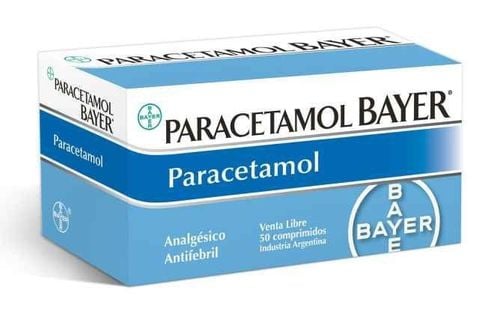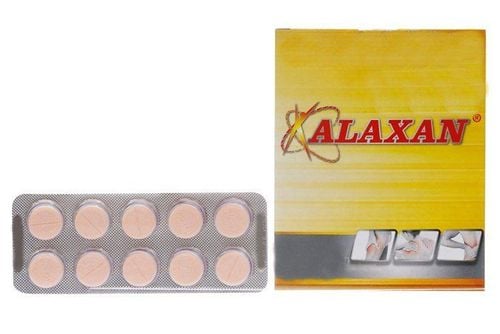This is an automatically translated article.
Acetaminophen and Ibuprofen come in the form of an oral tablet, which is a combination pain reliever. Medications are indicated for the relief of pain of various causes.
1. Uses of Acetaminophen and Ibuprofen
Acetaminophen and Ibuprofen is a pain reliever that combines the drug Acetaminophen and the drug Ibuprofen. Acetaminophen is a pain reliever and fever reducer. Ibuprofen is a non-steroidal anti-inflammatory drug (NSAID). Acetaminophen and Ibuprofen is a combination medicine used to treat pain of many causes such as: Headache, muscle pain, toothache, backache, arthritis, and menstrual pain.
In addition, Acetaminophen and Ibuprofen may also be prescribed by your doctor for other purposes not listed above.
2. How to use and dose of Acetaminophen and Ibuprofen
Usage: Orally. Should take the drug with food if the 2 components of the drug can adversely affect the stomach. If pain does not improve after 10 days or develops new symptoms such as redness or swelling, the patient should call their doctor immediately.
Dosage: Exactly as prescribed by the doctor (the lowest effective dose according to the medical condition). Patients are advised not to take more than 6 pills in 24 hours. Acetaminophen overdose can cause liver damage or even death. Ibuprofen overdose can damage the stomach or intestines.
Overdose: In case of overdose of Acetaminophen and Ibuprofen, the patient should call 911 immediately. Overdose symptoms may include: Asthenia, nausea, vomiting, loss of appetite, stomach pain, dark urine, coughing up blood, black or bloody stools, yellowing of the skin or eyes, shallow breathing, fainting,...
Missed dose: Because Acetaminophen and Ibuprofen are used as needed, the patient may not follow the dosing schedule. The patient may skip the missed dose if it is almost time for the next dose.
3. Acetaminophen and Ibuprofen side effects
Patients need emergency medical care if they have an allergic reaction such as: hives, difficulty breathing, swelling of the face, lips, tongue, or throat or signs of a heart attack, stroke such as pain from the chest to the jaw or shoulder , sudden numbness or weakness on one side of the body, leg swelling, slurred speech, trouble breathing,...
In rare cases, Acetaminophen can cause serious skin reactions, even death. Discontinue use if patient develops redness or widespread rash causing blistering or peeling of the skin. If this reaction occurs, the patient should not take any medicine containing Acetaminophen in the future.
The patient should stop taking the medicine and call the doctor immediately if:
Swelling, rapid weight gain, difficulty breathing; Urinating little or no urine; Loss of appetite, stomach pain or worsening stomach pain; stools with fresh blood or tarry color; Coughing up blood or vomit that looks like coffee grounds; Dark urine, yellow skin or eyes, and clay-colored stools.
4. Be careful when using Acetaminophen and Ibuprofen
Some notes for patients to remember when using Acetaminophen and Ibuprofen:
Do not use the drug if you are allergic to Acetaminophen, Ibuprofen, Aspirin or other NSAIDs; Ibuprofen can increase your risk of a fatal heart attack or stroke, especially if you use it long-term, in high doses, or if you have heart disease. Do not use the drug immediately before or after coronary artery bypass graft surgery; Ibuprofen can cause stomach or intestinal bleeding, even death, especially in older people; Ask your doctor if it is safe if you have ever: Have heart disease, high blood pressure, heart attack, stroke, blood clots, heartburn, stomach ulcers or bleeding, cirrhosis of the liver, or other medical conditions. other liver disease, kidney disease, asthma, frequent alcohol consumption,...; Consult your doctor before taking this medicine if you are pregnant or breast-feeding. For pregnant women, it is recommended not to use Acetaminophen and Ibuprofen (unless the doctor tells you to) because the drug can cause many complications for pregnancy; Do not give this medicine to children under 12 years of age without your doctor's approval; Take medicine exactly as directed by your doctor to avoid the risk of overdose; Do not use any other medicine that may contain Acetaminophen to avoid the risk of overdose; Ask your doctor before using other medicines for pain, fever, swelling or flu, colds, etc. as they may contain ingredients similar to Ibuprofen; Avoid drinking alcohol while taking Acetaminophen and Ibuprofen because it can increase the risk of stomach bleeding or liver damage; Avoid taking Acetaminophen and Ibuprofen if you are taking aspirin to prevent heart attack or stroke. Ibuprofen may decrease the effectiveness of aspirin in protecting the heart and blood vessels.
5. Acetaminophen and Ibuprofen drug interactions
Patients should consult their doctor before using Acetaminophen and Ibuprofen if you are taking antidepressants. Taking some antidepressants with NSAIDs can make it easy to bruise or bleed.
In addition, other drugs can also affect Acetaminophen and Ibuprofen, so patients need to inform their doctor about the drugs they are taking to receive appropriate advice.
During the use of Acetaminophen and Ibuprofen, to avoid the risk of unpredictable side effects, patients should share all information about their medical history with their doctor. At the same time, the patient should take the medicine exactly as prescribed.
Follow Vinmec International General Hospital website to get more health, nutrition and beauty information to protect the health of yourself and your loved ones in your family.
Please dial HOTLINE for more information or register for an appointment HERE. Download MyVinmec app to make appointments faster and to manage your bookings easily.













